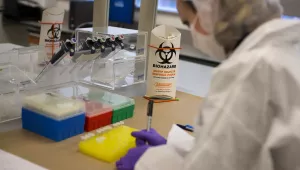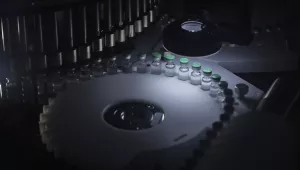Roger Brent is a Member of the Division of Basic Sciences at the Fred Hutchinson Cancer Research Center in Seattle. Brent is also an Adjunct Member in Public Health Sciences at FHCRC, and holds University of Washington affiliate appointments in Genome Sciences and in Bioengineering (1, 2).
Brent's lab develops methods and concepts to study cell signaling and decisionmaking systems in single cells. His current work studies how cells increase the precision of the information carried by internal signals and of causes and consequences of non-genetic variation in signaling and response (1, 2, 3). This had led recently to development of means to better regulate gene expression in the face of this non-genetic variation (unpublished). In very new work, his lab is pursuing means to use trained algorithms for epistemic support: that is, to enlist them as nonhuman observers whose different perspectives might help human formulate testable hypotheses and gain new knowledge.
As an undergraduate, Brent studied computer science, with a minor in mathematics, at the University of Southern Mississippi. There, he applied then-contemporary ideas from AI in an attempt to fold proteins. Later as a graduate student and postdoc with Mark Ptashne at Harvard, Brent demonstrated genetic function for, cloned, and characterized the protein that regulates the bacterial response to DNA damage, and first developed bacterial repressor proteins and chimeric proteins to control and study gene regulation. This work established the modular nature of eukaryotic transcription regulators. This work also resulted in lasting design principles for building modular experimental molecular constructs inside cells to gain scientific insight, with an early example being genetic methods to study protein interactions. Before coming to FHCRC, Brent co-founded with Sydney Brenner the Molecular Sciences Institute in Berkeley, where he and his coworkers contributed to the ideology and scientific content of parts of contemporary systems and synthetic biology. His contributions have been recognized with honors and awards. Some of his inventions have had commercial value. He is inventor on 16 issued and 4 pending US patents, and on numerous foreign patents (2).
Also relevant here: In 1986, together with other Harvard professors, Brent started Current Protocols in Molecular Biology, a "how to clone it" manual. CPMB has grown into the CP family of journals, which are continually updated to reflect new methodological developments and have >2M paid subscribers worldwide (2). In April 2018 CPMB will publish its 122nd quarterly update. For CPMB, Brent writes, edits and perforce maintains situational awareness of new developments across a swath of biological methods. In addition to consulting with companies and service to the NIH, Brent has since 1996 advised USG on defense against biological attack, and served on different US government groups in support of this mission. Since the late 1990s, he has devoted effort to considering the course (including defense consequences) of biological technologies as a whole, and their impact on human affairs, with particular focus on the consequences of developments in IT as those interact with developments in biology. He thinks about and has written on defense strategy in bio (4) and other arenas.
1) www.brentlab.org
2) https://en.wikipedia.org/wiki/Roger_Brent
3) Andrews, S., Peria, W., Yu. R,. C., Colman-Lerner, A., and Brent, R. (2016). Feedback and push-pull mechanisms can align signaling system outputs with inputs. Cell Systems 3 (5): 444-455.e2
4) Brent, R. (2005). In the Valley of the Shadow of Death. https://dspace.mit.edu/handle/1721.1/34914



